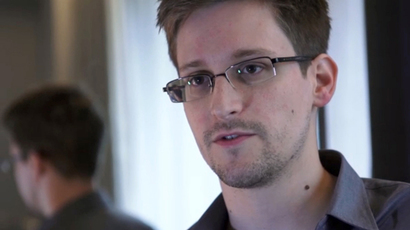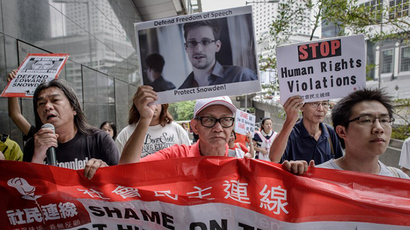Edward Snowden: Truth is coming, and it cannot be stopped
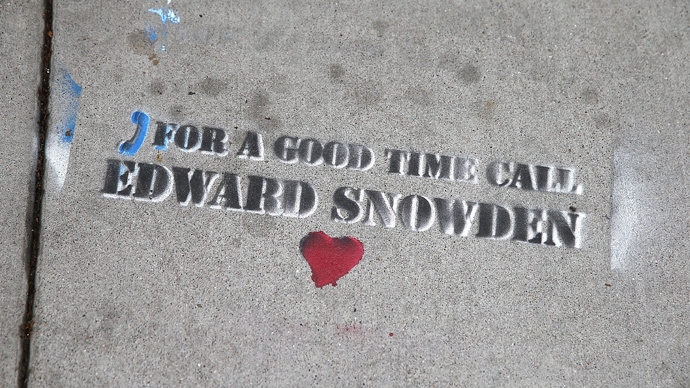
The threat of imprisonment or murder will not stop the truth from coming out, Edward Snowden, the whistleblower who blew the lid on the massive National Security Agency surveillance program, told the Guardian in a live Q&A.
The 29-year-old former NSA contractor in conjunction with Glenn Greenwald, The Guardian journalist who broke the story on the NSA’s two controversial data-collection programs which targeted Americans and foreign allies alike, took questions online regarding the fallout from the massive intelligence leak.
Edward Snowden kicked off the session by describing the targeted
campaign by the US government to paint him as a traitor, “just
as they did with other whistleblowers." The smear campaign,
he argues, has destroyed the possibility of a fair trial at home.
In this regard, his decision to leave the United States was not
based on any desire to evade justice, especially since he
believes he can “do more good outside of prison.”
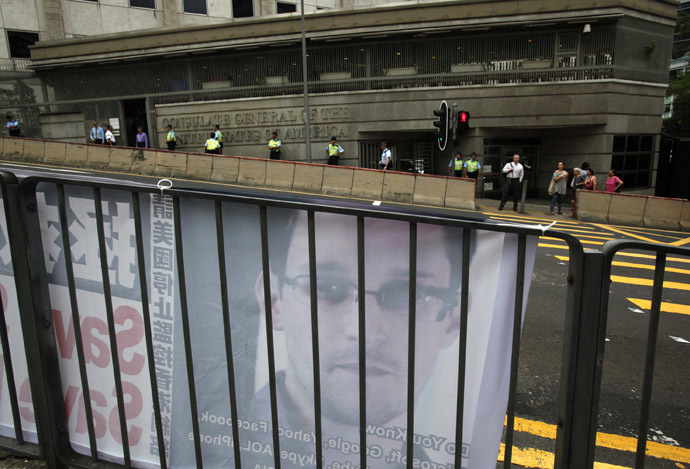
Snowden realized his choice of Hong Kong as a refuge would stir
up anti-Chinese hysteria in the US media and be used as a tool to
“distract away from the issue of US government
misconduct.” He remained emphatic, however, that he had in no
way shape or form acted on behalf of Beijing, saying that he
“only works with journalists.”
“Ask yourself: if I were a Chinese spy, why wouldn't I have
flown directly into Beijing? I could be living in a palace
petting a phoenix by now.”
He was further dismissive of the perennial, dual-pronged approach
from US officials to play the terror card in an effort to shut
down discussion regarding their every increasing authority and
the traitor angle to dismiss those who advocate government
transparency.
Regarding the former tactic, Snowden argues the fourth estate can verify the veracity of government claims by analyzing how and if the government’s massively expanded powers have resulted in the actual prevention of terror plots.
“Journalists should ask a specific question: since these programs began operation shortly after September 11th, how many terrorist attacks were prevented SOLELY by information derived from this suspicionless surveillance that could not be gained via any other source? Then ask how many individual communications were ingested to achieve that, and ask yourself if it was worth it. Bathtub falls and police officers kill more Americans than terrorism, yet we've been asked to sacrifice our most sacred rights for fear of falling victim to it.”
'Being called a traitor by Dick Cheney is highest honor for an
American'
Snowden further deployed his considerable wit to cast aspersion on members of the US political elite who had led leveled the traitor charge against him.
“It's important to bear in mind I'm being called a traitor by men like former Vice President Dick Cheney. This is a man who gave us the warrantless wiretapping scheme as a kind of atrocity warm-up on the way to deceitfully engineering a conflict that has killed over 4,400 and maimed nearly 32,000 Americans, as well as leaving over 100,000 Iraqis dead. Being called a traitor by Dick Cheney is the highest honor you can give an American, and the more panicked talk we hear from people like him, [Democratic Senator Dianne] Feinstein, and [Republican Senator Peter]King, the better off we all are. If they had taught a class on how to be the kind of citizen Dick Cheney worries about, I would have finished high school.”
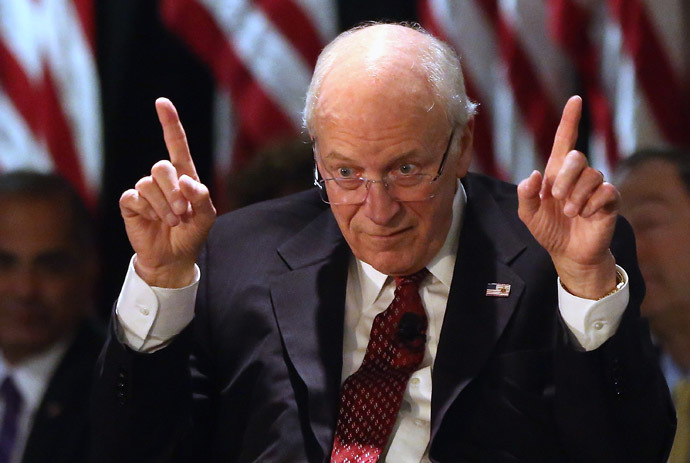
Living a life on the run had previously led Snowden to say that
none of the options ahead of him were good, but his ultimate goal
would be realized no matter what fate awaited him.
"All I can say right now is the US Government is not going to
be able to cover this up by jailing or murdering me. Truth is
coming, and it cannot be stopped."
Despite the risks, his message to other potential whistleblowers
was unequivocal: "This country is worth dying for."
Snowden, who had previously stated that he painstakingly
evaluated every document he had disclosed to ensure that it was
legitimately in the public interest, reiterated that had not in
fact posed a national security threat.
“I did not reveal any US operations against legitimate
military targets. I pointed out where the NSA has hacked civilian
infrastructure such as universities, hospitals, and private
businesses because it is dangerous. These nakedly, aggressively
criminal acts are wrong no matter the target," he argued.
'Draconian responses simply build better whistleblowers'
When pressed over whether it was his intention to insinuate that
Bradley Manning, the United States soldier currently on trial for
passing classified material to WikiLeaks, indiscriminately dumped
classified information with the intention of harming people, the
former CIA employee defended both the Army Private and the online
non-profit.
“WikiLeaks is a legitimate journalistic outlet and they
carefully redacted all of their releases in accordance with a
judgment of public interest. The unredacted release of cables was
due to the failure of a partner journalist to control a
passphrase. However, I understand that many media outlets used
the argument that 'documents were dumped' to smear Manning, and
want to make it clear that it is not a valid assertion here.”
Snowden said the “draconian” campaigns against Manning, NSA whistleblowers Thomas Drake and William Binney, , and CIA whistleblower John Kiriakou would result in even more anti-corruption and government transparency advocates aspiring to greater acts of boldness.
“Binney, Drake, Kiriakou, and Manning are all examples of how overly-harsh responses to public-interest whistle-blowing only escalate the scale, scope, and skill involved in future disclosures. Citizens with a conscience are not going to ignore wrong-doing simply because they'll be destroyed for it: the conscience forbids it. Instead, these draconian responses simply build better whistleblowers. If the Obama administration responds with an even harsher hand against me, they can be assured that they'll soon find themselves facing an equally harsh public response.”
Incidentally, Binney told RT last December how the FBI was engaged
in widespread surveillance against the bulk of American
citizenry, including members of congress.
In April 2012, Binney said the NSA had intercepted 20 trillion communications “transactions” of American citizens, including phone calls and emails, via the Bush-era Stellar Wind surveillance programs.
That such programs were continued and expanded under the current administration led to Snowden's disillusion with Obama, who he claims has “closed the door on investigating systemic violations of law, deepened and expanded several abusive programs.” However, Snowden believes Obama has not yet reached the point of no return.
“He still has plenty of time to go down in history as the President who looked into the abyss and stepped back, rather than leaping forward into it.”
'IPS, content, attachments: Analysts get everything'
With the promise of further revelations, Snowden dispelled any disinformation intended to downplay the scope of US Intelligence surveillance capabilities, describing a murky legal framework with virtually no oversight which gives signals intelligence analysts carte blanche when it comes to the collection of American’s private communications.
“…if an NSA, FBI, CIA, DIA (Defense Intelligence Agency), etc. analyst has access to query raw SIGINT (signals intelligence) databases, they can enter and get results for anything they want. Phone number, email, user id, cell phone handset id (IMEI), and so on - it's all the same. The restrictions against this are policy based, not technically based, and can change at any time. Additionally, audits are cursory, incomplete, and easily fooled by fake justifications. For at least GCHQ, the number of audited queries is only 5% of those performed.”
Snowden continues that the Foreign Intelligence Surveillance
Court essentially acts as a rubberstamp judicial body which, for
all intents and purposes, operates on an ad hoc basis, as
“Americans’ communications are collected and viewed on a daily
basis on the certification of an analyst rather than a
warrant.”
This so-called “incidental” collection has very real world
implications, as the “content of your communications”
which has been obtained without a warrant is still accessible to
NSA workers for future use.
When asked to clarify if by content, he means a record that the
correspondence took place or the actual content itself, Snowden
said the answer is “both.”
“If I target for example an email address, for example under
FAA (FISA Amendments Avy) 702, and that email address sent
something to you, Joe America, the analyst gets it. All of it.
IPs, raw data, content, headers, attachments, everything. And it
gets saved for a very long time - and can be extended further
with waivers rather than warrants.”
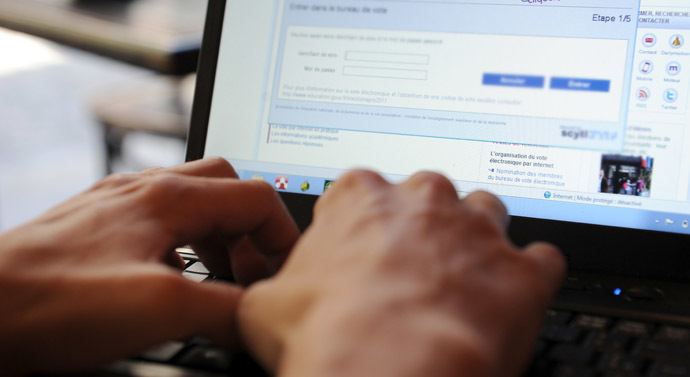
Snowden argued that for those hoping to bolster their security against invasive government snooping, encryption remains a viable option, though with one major caveat.
“Encryption works. Properly implemented strong crypto systems
are one of the few things that you can rely on. Unfortunately,
endpoint security is so terrifically weak that NSA can frequently
find ways around it.”
Snowden concedes that US citizens do enjoy both limited
“policy protections” as well as a “very weak technical
protection,” albeit one which does not preclude US
communications from getting swept up by Sigint ingestion points,
especially once they cross the border.
“More fundamentally, the ‘US Persons’ protection in general is
a distraction from the power and danger of this system,” he
stresses.
“Suspicionless surveillance does not become okay simply
because it's only victimizing 95% of the world instead of 100%.
Our founders did not write that "We hold these Truths to be
self-evident, that all US Persons are created equal." he
stresses.
Snowden further argued that dividing people down nationalist
lines was no substitute for probable cause.
“The US Person / foreigner distinction is not a reasonable
substitute for individualized suspicion, and is only applied to
improve support for the program. This is the precise reason that
NSA provides Congress with a special immunity to its
surveillance.”
Ending with a show of appreciation to all of his supporters,
Snowden implored them to remember one fundamental point: “just
because you are not the target of a surveillance program does not
make it okay.”














